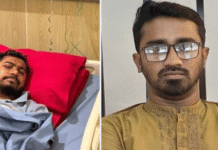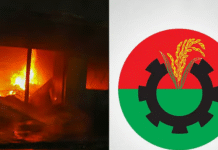Abu Hena
SAY sayonara to election. Bipartisanship is all but dead in Bangladesh. U.S. Secretary of State John Kerry and U. N. Secretary General Ban Ki Moon urged both the leaders to reach a consensus through dialogue. But their efforts turned out to be a bridge too far. While Begum Khaleda Zia wins points for coming across as an accommodating leader, the dream of a less polarized politics has been deferred indefinitely —- at least until someone builds a new mass movement of independent voters with the help of a ‘Terminator.’
Before one explains what a ‘Terminator’ has to do with the detoxification of Bangladesh politics, we may briefly view how the prospects of a fair election went bust. After the rescinding of the 13thAmendment, every sentient civil society activist including top professionals and elderly politicians knew that we needed a consensus on how to conduct the upcoming election. It looked as if the initiatives taken by the U. N. Secretary General and the U. S. Secretary of State would get at least some positive response from prime minister Sheikh Hasina.
Then, before even pondering the intensity of the calls from Ban Ki Moon and John Kerry, the prime minister sent out the word: No – not even a ‘hair- breadth’ concession to the opposition. Even after the leader of the opposition agreed to send two representatives to New York to strike a deal to be mediated by the UN during the UNGA session, Sheikh Hasina shifted to new vacuous arguments that talks outside the country were irrelevant.
Fallacious argument
The government made up a story that they had no chance to do anything beyond the 15th Amendment which was carried out in compliance with the Supreme Court directives and claimed that an election held under an elected government was better than a non – representative caretaker government. Such contentions have been proved demonstratively false time and again. Over the past decades, non–partisan caretaker government has proved to be an almost perfect vehicle for a fair election whether or not the Constitution approved it or not. The 1991 election was conducted by a caretaker government headed by the sitting Chief Justice of the Supreme Court showing little regard for the Constitution which is now being considered sacrosanct. In 1996 a retired Chief Justice of the Supreme Court conducted the election as the caretaker chief after the 13th Amendment formally recognized the caretaker system as a much less controversial means of ensuring an acceptable election. In 2001 the election was held under another caretaker government headed by a retired Chief Justice ensuring peaceful transfer of power from the AL to the four party alliance led by BNP which included Jaamaat-e-Islami as one of the partners. The last such election which was held in 2007 was duly conducted by a caretaker government comprising non-partisan members.
During this period all politicians of all shades of opinions learned to embrace the term ‘populist’ believing in the rights, wisdom and virtues of common people. In that wisdom of the people’s voice reigned supreme attesting to the truth of the time honored statement: ‘For forms of government let fools contend, what is administered best is best.’ All throughout this period all political parties relied on the wisdom of the ‘populist rage’ and not the rigours of the Constitution.
But now what those people are trying to say is not clear. The explanations for the current political cycle are as various as those legendary blind men feeling different parts of an elephant: a controversial Supreme Court judgment declaring the caretaker system as clashing with the Constitution, prospectively providing at the same time for two more elections under the same system. That followed a hasty constitutional amendment that went too far, too fast, losing sight of reality totally ignoring the relaxation which was made to meet the circumstances. The result is a total deadlock, which even the UN Secretary General has failed to break.
SH/Defeats hardened stance
The recent Mayoral election result in five city corporations, in which the Nationalist Party seized the seats held by the Awami League, threw the 14 party ruling alliance into a monumental dizzy. The alliance is now in danger of learning wrong lessons from the defeats. After all, they seem to have learned the wrong lessons from their electoral triumph about five years ago. They are the majority, and they should act like one – boldly and decisively. It raises the question—do we want egotism or vision, someone looking over his shoulder or into the future? If the aftershocks of the Mayoral elections mean that we will now see pragmatism that solves problems and unites the nation, that’s great. But if the people who lead us become ever more afraid of their own shadows, afraid to compromise and legislate for the future as well as for the present, it will surely mean slow death of democracy.
The big question is: if the ruling party thinks the caretaker system is a rotten piece of sausage, why did they paralyze the nation by 173 days’ countrywide strikes to force the then BNP government to adopt it in the Constitution in 1996? If they were convinced then that such a system was necessary to ensure a fair election, why don’t they now team up with the opposition to continue with it as long as it is necessary?
Part of the answer is political. Sheikh Hasina wants to break the BNP alliance’s momentum and make it fail in the election as her son Sajib Wazed Joy has already predicted – so he can say afterwards, ‘I told you so.’ Part of the answer is principled. Sheikh Hasina is philosophically opposed to handing over power to Khaleda Zia’s BNP. As she said in many speeches, none except Awami League has the right to rule the country. In her opinion BNP is the enemy of the country and it is composed of anti-liberation forces. Such utterances are the product of historical ignorance and are totally inaccurate. All throughout the month of March in 1971 the 167 Awami Leaguers who were elected to the Pakistan Constituent Assembly remained busy framing the Constitution of Pakistan on the basis of the Six Points and the Lahore Resolution. After the rampage created by the Pakistani army on 25 March Sheikh Mujibur Rahman was taken a prisoner and none of the top leaders of the party came out with the declaration of independence. It was in this void that the 8th East Bengal Regiment stationed in Chittagong revolted against the Pakistani Brigade, killed the Brigade Commander, took control of the port city and declared the country’s independence. Major Ziaur Rahman, who led the operation and made the declaration later formed the Bangladesh Nationalist Party.
SH/Flawed system
And a part of the answer is structural. The Underlying explanation for failure of our democracy is our flawed system of selecting candidates for parliamentary elections. It sounds strange, but very few opposition candidates now fear being beaten by an Awami Leaguer in polls. In 1996 when Awami League first came to power after long twenty years, its candidates in the general election were mostly of modest means. But now after ten years in power they now own 23 commercial banks and 42 insurance companies. Many others are big shots in public banks, corporations and institutions. In the Awami League dominated parliament 73 percent MPs are business magnets. They have little contact with the grassroots and have high odds of surviving a general election. Yet, because of the vested interests that have grown over time AL cannot afford to lose the election.
The selection process of candidates in general elections is disturbingly antidemocratic. It disenfranchises independents and even the common rank of party workers and supporters who make up about two-thirds of the electorate and have no say in the selection procedure. Only a handful of leaders at the party hierarchy who work at the behest of the party chiefs decide the nominations. It pushes candidates in both parties to the extremes which polarizes the entire selection process in ways that don’t reflect the centrist views of the vast majority of citizens. And it allows the top brass and a group of activists close to the powerful leaders to determine who runs the country. All told, only a small percentage of adult citizens are involved in this process, which means that our representative democracy is not that representative after all.
In the situation the best remedy is a truly open primary, where the top two vote getters square off in the general election, even if they are from the same party. This sounds radical, but that’s the only way people can have their say in the country’s affairs. Not surprisingly, interest groups and party regulars tend to hate the idea and the top bosses will reject it. But the general public and the independents will enthusiastically back it. It is a difficult task, but it can start by offering a new birth of freedom for independents talented political aspirants trying to move the country out of the valley of party dictatorship.
The writer is a former Member of Parliament
Source: Weekly Holiday









